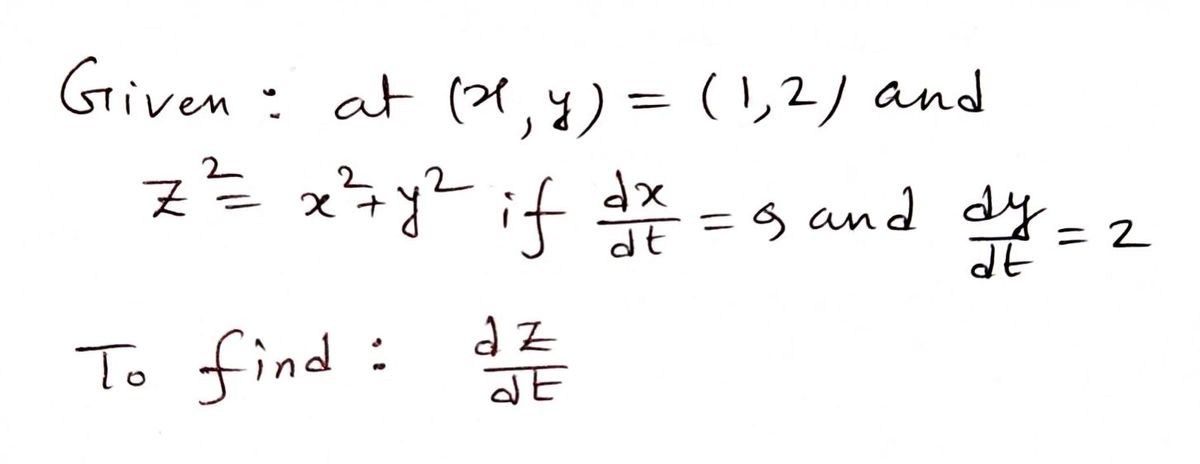Calculus: Early Transcendentals
8th Edition
ISBN:9781285741550
Author:James Stewart
Publisher:James Stewart
Chapter1: Functions And Models
Section: Chapter Questions
Problem 1RCC: (a) What is a function? What are its domain and range? (b) What is the graph of a function? (c) How...
Related questions
Question
![**Problem Statement:**
Find \(\frac{dz}{dt}\) at \((x, y) = (1, 2)\) and \(z^2 = x^2 + y^2\) if \(\frac{dx}{dt} = 9\) and \(\frac{dy}{dt} = 2\).
---
**Solution:**
To find \(\frac{dz}{dt}\), we'll use the chain rule for derivatives. Given:
- \(z^2 = x^2 + y^2\),
Differentiate both sides with respect to \(t\):
\[
2z \frac{dz}{dt} = 2x \frac{dx}{dt} + 2y \frac{dy}{dt}
\]
Simplify:
\[
z \frac{dz}{dt} = x \frac{dx}{dt} + y \frac{dy}{dt}
\]
Given values:
- \(x = 1\)
- \(y = 2\)
- \(\frac{dx}{dt} = 9\)
- \(\frac{dy}{dt} = 2\)
First, find \(z\) using \(z^2 = x^2 + y^2\):
\[
z^2 = 1^2 + 2^2 = 1 + 4 = 5
\]
Thus,
\[
z = \sqrt{5}
\]
Substitute into the differentiated equation:
\[
\sqrt{5} \frac{dz}{dt} = 1 \cdot 9 + 2 \cdot 2
\]
\[
\sqrt{5} \frac{dz}{dt} = 9 + 4
\]
\[
\sqrt{5} \frac{dz}{dt} = 13
\]
Solve for \(\frac{dz}{dt}\):
\[
\frac{dz}{dt} = \frac{13}{\sqrt{5}}
\]
---
\(\frac{dz}{dt} = \frac{13}{\sqrt{5}}\)
This is the derivative of \(z\) with respect to \(t\) at the given point and conditions.](/v2/_next/image?url=https%3A%2F%2Fcontent.bartleby.com%2Fqna-images%2Fquestion%2Fe2ddea42-024d-4d2b-8b3f-b1dea66ecb36%2F2ee1bac7-11ea-443e-85c6-4e8e9c62cc98%2F6pu1p4l_processed.png&w=3840&q=75)
Transcribed Image Text:**Problem Statement:**
Find \(\frac{dz}{dt}\) at \((x, y) = (1, 2)\) and \(z^2 = x^2 + y^2\) if \(\frac{dx}{dt} = 9\) and \(\frac{dy}{dt} = 2\).
---
**Solution:**
To find \(\frac{dz}{dt}\), we'll use the chain rule for derivatives. Given:
- \(z^2 = x^2 + y^2\),
Differentiate both sides with respect to \(t\):
\[
2z \frac{dz}{dt} = 2x \frac{dx}{dt} + 2y \frac{dy}{dt}
\]
Simplify:
\[
z \frac{dz}{dt} = x \frac{dx}{dt} + y \frac{dy}{dt}
\]
Given values:
- \(x = 1\)
- \(y = 2\)
- \(\frac{dx}{dt} = 9\)
- \(\frac{dy}{dt} = 2\)
First, find \(z\) using \(z^2 = x^2 + y^2\):
\[
z^2 = 1^2 + 2^2 = 1 + 4 = 5
\]
Thus,
\[
z = \sqrt{5}
\]
Substitute into the differentiated equation:
\[
\sqrt{5} \frac{dz}{dt} = 1 \cdot 9 + 2 \cdot 2
\]
\[
\sqrt{5} \frac{dz}{dt} = 9 + 4
\]
\[
\sqrt{5} \frac{dz}{dt} = 13
\]
Solve for \(\frac{dz}{dt}\):
\[
\frac{dz}{dt} = \frac{13}{\sqrt{5}}
\]
---
\(\frac{dz}{dt} = \frac{13}{\sqrt{5}}\)
This is the derivative of \(z\) with respect to \(t\) at the given point and conditions.
Expert Solution
Step 1: Given that

Step by step
Solved in 3 steps with 3 images

Recommended textbooks for you

Calculus: Early Transcendentals
Calculus
ISBN:
9781285741550
Author:
James Stewart
Publisher:
Cengage Learning

Thomas' Calculus (14th Edition)
Calculus
ISBN:
9780134438986
Author:
Joel R. Hass, Christopher E. Heil, Maurice D. Weir
Publisher:
PEARSON

Calculus: Early Transcendentals (3rd Edition)
Calculus
ISBN:
9780134763644
Author:
William L. Briggs, Lyle Cochran, Bernard Gillett, Eric Schulz
Publisher:
PEARSON

Calculus: Early Transcendentals
Calculus
ISBN:
9781285741550
Author:
James Stewart
Publisher:
Cengage Learning

Thomas' Calculus (14th Edition)
Calculus
ISBN:
9780134438986
Author:
Joel R. Hass, Christopher E. Heil, Maurice D. Weir
Publisher:
PEARSON

Calculus: Early Transcendentals (3rd Edition)
Calculus
ISBN:
9780134763644
Author:
William L. Briggs, Lyle Cochran, Bernard Gillett, Eric Schulz
Publisher:
PEARSON

Calculus: Early Transcendentals
Calculus
ISBN:
9781319050740
Author:
Jon Rogawski, Colin Adams, Robert Franzosa
Publisher:
W. H. Freeman


Calculus: Early Transcendental Functions
Calculus
ISBN:
9781337552516
Author:
Ron Larson, Bruce H. Edwards
Publisher:
Cengage Learning